Yuval Noah Harari, a historian with an eclectic academic background in the humanities and sciences, is one of the most important thinkers of our time. Sapiens is his first book that has been translated into over 40 languages. The book deals with what it means to be human or Homo sapiens. It also talks about how humans are different from other animals and why we have not seen any new types of humans for thousands of years.
Sapiens: A Brief History of Humankind is a sweeping narrative of the human condition in which he seeks to answer fundamental questions about who we are and how we got here. It’s also quite an ambitious undertaking, as it covers the entirety of human history (from pre-history to today), while taking into account such diverse disciplines as anthropology, biology, psychology, sociology and more.
Sapiens tells us that humans have been shaped by waves – or revolutions – in our understanding of the world. The Cognitive Revolution enabled us to think symbolically and abstractly; for example by creating gods from natural phenomena like thunderstorms. The Agricultural Revolution allowed us to develop larger societies with hierarchies because farming allowed us to produce a surplus of food, and the Scientific Revolution that allowed humans to become undisputedly the most dominant species on the planet.
“Farming led to reading and writing, which in turn accelerated technological progress.” Harari also claims that “the next revolution will be designer humans,” as we take control over our own evolution due to new age technologies.
Sapience is an exciting journey. This books is unlike any other books that I usually read. I enjoyed it thoroughly given my background in zoology and my innate interest in the evolution of human beings. However, I must warn you that some of you who may find the scientific names and descriptions of different kinds of humans and pre humans, a little difficult to keep up with. If you have ever wondered who we are, and how we got here, Sapience is a must read for you.







